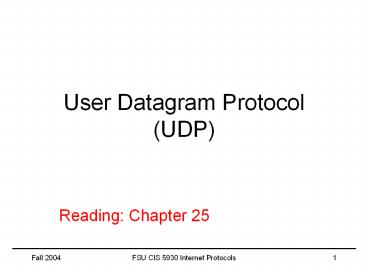User Datagram Protocol (UDP) - PowerPoint PPT Presentation
Title:
User Datagram Protocol (UDP)
Description:
User Datagram Protocol (UDP) Reading: Chapter 25 UDP Unreliable, connectionless datagram service Desirable for: Short transactions, avoiding overhead of establishing ... – PowerPoint PPT presentation
Number of Views:249
Avg rating:3.0/5.0
Title: User Datagram Protocol (UDP)
1
User Datagram Protocol (UDP)
- Reading Chapter 25
2
UDP
- Unreliable, connectionless datagram service
- Desirable for
- Short transactions, avoiding overhead of
establishing/tearing down a connection - DNS, time, etc
- Applications withstanding packet losses but
normally not delay - Real-time audio/video
- Pretty simple protocol
- Multiplexing application processes
3
Packet format
UDP packet format
Pseudo packet header
4
UDP packet header
- Source port number
- Destination port number
- UDP length
- Including both header and payload of UDP
- Checksum
- Covering both header and payload, and the pseudo
header
5
Implementation
- Data structures
- Passing payload
- UDP datagram
- Interface to application layer
- Interface to IP
- Functions
- Sending UDP datagrams
- Receiving UDP datagrams
6
Passing payload
msg_name
msg_namelen
msg_iov
msg_iovlen
msg_control
msg_controllen
msg_flags
iov_base
iov_len
struct msghdr
struct iovec
7
UDP datagram
uh
saddr
daddr
iov
wcheck
source
dest
len
check
struct udpfakehdr
struct udphdr
8
Interface to application layer
name
close
connect
disconnect
ioctl
sendmsg
recvmsg
get_port
..
struct proto
9
Interface to IP
handler
err_handler
next
protocol
name
struct inet_protocol
10
Sending UDP datagram
- udp_sendmsg()
- Forming udpfakeudp data structure
- Msg, or connection state
- Processing control messages
- ip_cmsg_send()
- Routing
- If routing cache exists, use it
- ip_route_output()
- Passing to IP
- ip_build_xmit() with callback function
- udp_getfrag()/udp_getfrag_nosum()
- Geting the real payload
11
udp_getfrag()
- Passing the layload to IP
- If it is the last segment (containing UDP header)
- Computing checksum for leftover data, UDP header,
UDP faked header - Inserting checksum into UDP header
- Passing data (one segment) to IP
- csum_partial_copy_fromiovecend()
12
Receiving UDP datagram
- udp_rcv()
- Computing checksum, make sure matching the one in
the packet - If multicasting/broadcasting packet
- udp_mcast_deliver()
- Checking to which socket queue the packet belongs
- udp_v4_lookup()
- Putting packet into socket queue if found queue
- udp_queue_rcv_skb()
- sock_queue_rcv_skb()
- Otherwise, sending ICMP
13
udp_mcast_deliver()
- Looking up queues to which the packet belongs
- Similar to udp_v4_lookup
- But it needs to find all the socket queues
- For each matched queue, passing the packet
- skb_clone()
- udp_queue_rcv_skb()
14
udp_recvmsg()
- Used to receive packet from socket queue by users
- Removing an skb_buff from queue
- Returning the corresponding payload
- Some helpful functions
- sbk_recv_datagram()
- skb_copy_datagram_iovec()
- skb_free_datagram()































